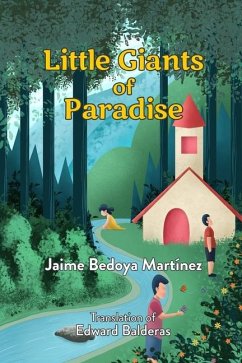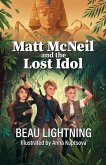Little Giants of Paradise is a short novel showcasing Jaime Bedoya Martínez's talent for creating fantastical storylines premised on the mundane and the visceral; that is, the natural world of insects and the surprisingly sophisticated social rituals and hierarchies which dominate their existence. His experience and insight as a laborer, manager, and educator in the fields of Colombia-a region blessed with some of the most diverse ecological areas in the world-is in full display as he creates modern mythological heroes and legends, not mythologies based on cultural or religious traditions. The engineering feats of bees, wasps, worms, fish, birds, et al. are framed as equivalent in quality to those in the hominid world. The writer also argues that these mechanical techniques have not been misappropriated towards providing the perverse greed of human society. Rather, our lower cousins have the explicit resolve to satisfy deeply coded responsibilities of survival and reproduction, not for the individual but for the ostensibly immortal community. Whatever we have thought of the brutish existence of these creatures (if we had considered it at all), the narrative clarifies the notion that death is merely the yang of life. The methodical ecstasy of this writer's voice opens our eyes to the minuscule and ubiquitous. What we often squash or poison in disgust serves as a metaphor for the contempt we have for our organic reality-a reality that, through programmatic ritualism, beckons with its comfort of collectivism and belonging but not gratuitously or cheaply. His remarkable telling of the minutiae details of the life and death of our long-separated ancestors reminds us that our human exceptionalism, based on our mechanical and artistic capacities, were long-believed unique to our legacy. But a careful look (and the writing of Bedoya) informs us that for millennia before us, this analogous activity has been part of the life and death of animal life. If we arrogantly consider these creatures primeval because of their lack of rational thought, ultimately, it becomes clear that this lack of rationale does not diminish their existence but rather prescribes a clearer path to meaning as their focused attention and loyalty to programmed ritual is more functional than the ennui of our scattered life. This insight into the high value of mortality mocks the human construct of death as pejorative or the virtue of any type of life-no matter its toxic nature. To the insect, death is a destiny, a resurrection of matter, a path to greater communal accomplishment. But then, as Bedoya has cleared the slate of human distraction and alienation with raw details of nature, a sweet romantic storyline of innocent love evolves between human characters, for surely, we all need witness and recognition of this epiphany. These relationships are nurtured and driven by the curiosity of the young mentored by the wise. Their search for meaning finds it, although hesitantly, in the survival mode of the insects. It is revealing that much of the empirical knowledge is acquired and revealed by those who both exploit and admire it. Bedoya seems to point to the necessity of mortal collaboration, whether as Sowers, harvesters, or partners of these remarkable creatures. Unlike lessons taught by more orthodox intellectual sources, these highly malleable youth find that transformation is not a physical or reincarnation process but rather the transformation of attitude and spirit. Bedoya's writing is both poetic and prosaic. On both levels, his reverence for the physical beauty of nature comes across in gorgeous descriptions of land he knows well, while the storyline is often brutal. His language is singsong and stoic, which serves the subject of this novel well.
Bitte wählen Sie Ihr Anliegen aus.
Rechnungen
Retourenschein anfordern
Bestellstatus
Storno





